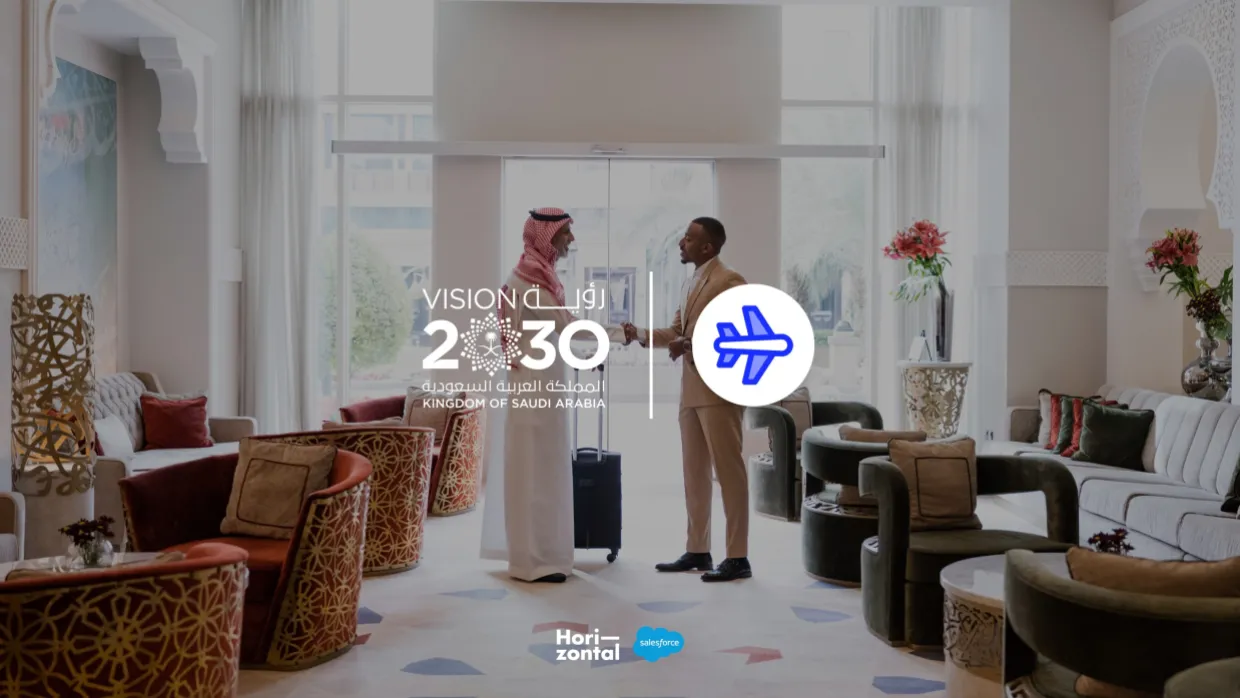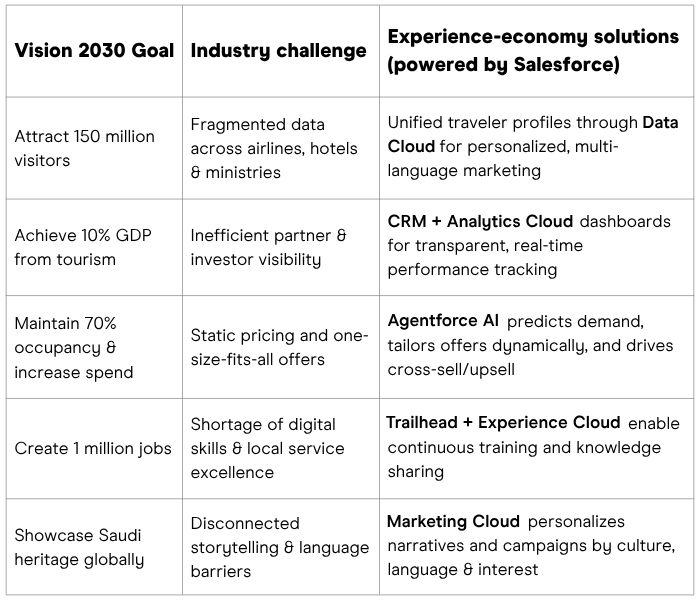AI
The Experience Economy Driving Saudi’s Tourism Revolution

As Vision 2030 redefines how the world experiences the Kingdom, the next great frontier isn’t infrastructure. It’s emotion at scale – powered by data, AI and Saudi hospitality.
By Adam Dore, Salesforce Practice Director – Middle East, India & Africa, Horizontal Digital
In 2030, a traveler landing in Riyadh or Jeddah won’t just visit Saudi Arabia – they’ll feel it.
A digital concierge greets them in their native language. Their itinerary, curated weeks earlier by an intelligent assistant, adjusts in real time to weather, traffic and local events.
From gate to gallery, souq to spa, every moment feels connected, not coincidental. That’s the experience economy Saudi Arabia is building – where data and empathy work together to turn travel into connection.
Travelers today already expect that level of ease and understanding. Their hotel knows how they take their coffee and books their favorite table before they even think to ask – the bar has shifted from service to anticipation.
It’s no wonder a Salesforce’s report found that keeping up with changing customer expectations is the top challenge for travel and hospitality leaders. Meeting those expectations requires more than service, it calls for intelligence, personalization and cultural fluency at every touchpoint.
That’s where data and AI step in as invisible hosts – quietly connecting airlines, hotels, and heritage sites to create one continuous story of discovery.
A scale never seen before
Saudi Arabia’s ambitions are breathtaking: 150 million annual visitors, a 10% GDP contribution and one million new jobs across travel, tourism and hospitality – all within five years’ time.
By 2030, the Kingdom will host more than 30 million pilgrims each year, add over 800,000 new hotel rooms, and welcome a new wave of travelers to awe-inspiring destinations like NEOM with its futuristic smart cities, The Red Sea’s regenerative eco resorts and Diriyah Gate’s revival of Saudi heritage.
And the world is watching. The Kingdom is preparing to host some of the biggest global events of the decade – including Expo 2030, the FIFA World Cup 2034 and the Esports World Cup – each a catalyst for innovation, infrastructure and immersive visitor experiences at unprecedented scale.
This is more than an infrastructure boom. It’s a shift from building destinations to designing experiences where every touchpoint, from flight booking to cultural discovery, becomes part of a connected national journey.
From disconnected journeys to data-driven experiences
For the Kingdom to deliver on these bold ambitions, it must first solve one defining challenge: a maze of disconnected data and systems.
Travelers still juggle multiple logins for flights, visas and hotel check-ins. Tour operators lack real-time visibility into cancellations or delays. Hotels can’t always recognize returning guests who booked through third-party sites.
But the fragmentation doesn’t stop there. Within many organizations, marketing, operations, and customer service teams still operate on separate systems – meaning a guest’s inquiry, booking and feedback often live in different places. The result? Gaps between promise and experience, and missed chances to turn a first visit into lasting loyalty.
Closing those gaps will define the next phase of transformation. It means unifying data both across industries and within businesses, giving every team – from marketing to housekeeping – a single, real-time view of the traveler. Intelligent automation then turns that visibility into action, making travel flow as effortlessly as the journeys it powers.
This is where Salesforce becomes the invisible infrastructure behind Saudi’s tourism vision – connecting the nation’s tourism data, systems and service networks into one intelligent view of every traveler and every moment that matters.
How Salesforce powers Vision 2030’s tourism ambitions
When these technologies work together, Saudi’s travel sector moves from reactive to predictive – anticipating demand, optimizing experiences and maximizing impact.

Less admin, more connection
Imagine an AI agent that detects a sudden influx of visitors for a festival in AlUla. In seconds, it alerts hoteliers, adjusts pricing, recommends experiences and helps authorities manage transport flow.
That’s not just smart tourism, that’s adaptive tourism, where data and AI turn complexity into coordination.
For operators, this means faster occupancy insights, better resource allocation and and smarter upsell opportunities – like automatically suggesting a spa upgrade, desert tour or dining experience based on a guest’s preferences. For travelers, it means journeys that feel cohesive from screen to street – every digital touchpoint enhancing the physical experience.
Yet today, many service teams in the travel and hospitality sector spend more time on screens than with guests. Salesforce’s State of Service report shows that representatives devote only 47% of their week to direct customer interaction, with the remaining 53% consumed by admin tasks, case notes and internal meetings.
This imbalance highlights why intelligent automation matters. When AI and data tools take care of the admin, people can get back to what they do best – creating exceptional experiences.
Experience is the new infrastructure
Vision 2030’s giga-projects may capture the world’s imagination, but their long-term success will depend on something less visible: the digital architecture that makes every journey feel world-class.
Salesforce provides that architecture – a cloud-based foundation that links marketing, sales, operations and service into a single, intelligent flow. Whether it’s powering airport efficiency, streamlining hotel check-ins or delivering multilingual customer support, the goal is simple: make Saudi Arabia the most connected tourism destination on earth.
Built in the Kingdom, for the Kingdom
True transformation doesn’t come from importing technology – it comes from embedding it locally.
Salesforce’s new Riyadh regional headquarters (opening later this year) and commitment to upskill 30,000 Saudi professionals by 2030 are clear signs of long-term investment.
Horizontal Digital shares that commitment, with a growing Riyadh-based team partnering directly with ministries, tourism boards and developers to design experiences that reflect Saudi authenticity – bilingual, mobile-first and built on trust.
Beyond 2030: Building connections that last
By 2030, the world won’t just visit Saudi Arabia – it will connect with it. Every booking, every journey, every conversation will reflect a deeper idea: that technology and tradition can work hand in hand to create something uniquely human.
Because in the Kingdom’s new experience economy, success won’t be measured in arrivals – it will be measured in moments remembered, and reasons to return.
About the author
Adam Dore is Salesforce Practice Director for the Middle East, India & Africa region at Horizontal Digital. He leads Salesforce strategy and delivery across sectors including tourism, government and hospitality, helping organizations connect technology, people and purpose to deliver measurable human impact.